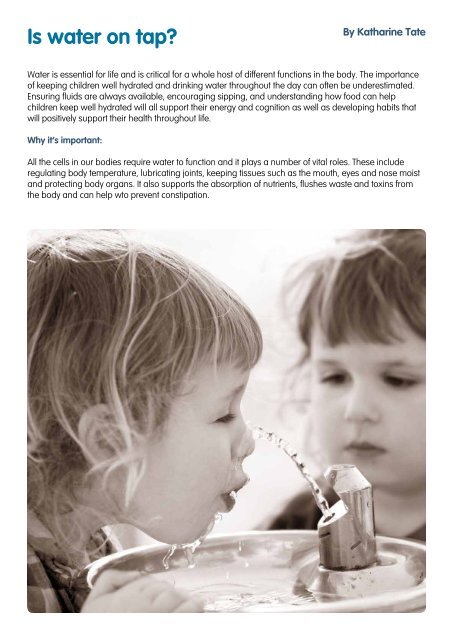Parenta Magazine November 2015
You also want an ePaper? Increase the reach of your titles
YUMPU automatically turns print PDFs into web optimized ePapers that Google loves.
Is water on tap?<br />
By Katharine Tate<br />
Water is essential for life and is critical for a whole host of different functions in the body. The importance<br />
of keeping children well hydrated and drinking water throughout the day can often be underestimated.<br />
Ensuring fluids are always available, encouraging sipping, and understanding how food can help<br />
children keep well hydrated will all support their energy and cognition as well as developing habits that<br />
will positively support their health throughout life.<br />
Why it’s important:<br />
All the cells in our bodies require water to function and it plays a number of vital roles. These include<br />
regulating body temperature, lubricating joints, keeping tissues such as the mouth, eyes and nose moist<br />
and protecting body organs. It also supports the absorption of nutrients, flushes waste and toxins from<br />
the body and can help wto prevent constipation.<br />
How much we need:<br />
There is not one universal recommendation<br />
regarding water requirements as it’s defined<br />
by many different factors including age, body<br />
mass, gender, environment and activity levels.<br />
The European Food Safety Authority (2008)<br />
recommendations suggest children up to the<br />
age of six need 100-190ml per kg per day and<br />
6-12 year olds need 800-1000ml per day but<br />
this also includes water from other beverages<br />
and food.<br />
Why good habits are vital for children:<br />
Infants and children have higher fluid requirements<br />
than adults for a number of different reasons,<br />
which is why establishing good habits is important.<br />
One key reason is their greater body water<br />
composition compared to adults, whose bodies<br />
tend to be made up of about 60% water. The total<br />
body mass of a foetus can be greater than 90%,<br />
whereas a new born is likely to be around 75%,<br />
which then gradually decreases during the first<br />
year of life.<br />
Children’s high surface area for their<br />
weight-to-weight ratio can increase water loss<br />
through the skin. As growth is so rapid during the<br />
first year and during adolescence children also<br />
have a high metabolic and respiratory rate<br />
increasing water loss via the lungs, which<br />
combined with skin, can account for about 35%<br />
of water loss. Children also have an immature<br />
thirst reflex and can go without water for long<br />
periods of time, highlighting the importance of<br />
caregivers in establishing regular drinking habits.<br />
Signs of dehydration:<br />
As a caregiver/parent it’s not always easy to<br />
identify the mild signs of dehydration which include<br />
feeling thirsty, alert, restless and reduced urine.<br />
Urine also becomes more concentrated and darker<br />
in colour. As the severity of dehydration increases<br />
moderate signs include drowsiness, sunken eyes<br />
and lethargy. Severe signs include apprehension,<br />
cold, cramps and even reduced consciousness.<br />
Research suggests that 60% of children are<br />
dehydrated first thing in the morning, which<br />
could be impacting on their cognition, energy<br />
and mood throughout the day.<br />
How to encourage good habits in early<br />
years settings:<br />
Encouraging children to regularly sip water can<br />
be beneficial for addressing their needs and<br />
establishing good habits. Talking about hydration<br />
to help children understand they loose water and<br />
they need to replace it can help them to begin to<br />
register the need to drink.<br />
About 20% of our water requirements come<br />
from food so raising awareness about foods<br />
that contain high levels of water and including<br />
those throughout the day as snacks can also<br />
develop good habits around food as well as<br />
supporting hydration. Foods that contain over<br />
70% water include bananas, sweet corn,<br />
strawberries, melon, pears, oranges, apples,<br />
grapes, cucumber, lettuce, tomatoes and carrots.<br />
Many of these foods are great for snacks and<br />
getting the children involved in the kitchen.<br />
Equally important, is avoiding foods which increase<br />
dehydration, such as processed meals and snacks<br />
with high salt content.<br />
Understanding the body's need for water and<br />
keeping children hydrated is essential, and<br />
establishing good habits at a young age may<br />
have an effect for life.<br />
The Food Teacher, Katharine Tate, is an award<br />
winning nutritional therapist, she has founded<br />
The Food Teacher brand that combines her<br />
passion for education and nutrition to deliver<br />
a healthy childhood, focusing on promoting<br />
family health through food and lifestyle. For<br />
more information, visit her Facebook page,<br />
follow her on Twitter or email her at<br />
thefoodteacheruk@gmail.com

















